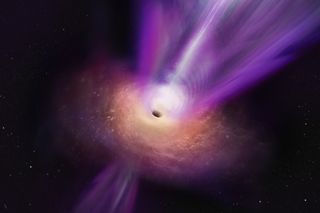Tiny black holes could have had a major impact on the early universe.
A large population of small black holes could have flooded the young cosmos with particles and radiation and created their own black hole Big Bangphysicists suggest in a new paper.
So far there is only one confirmed way to make black holes. You have to start with a massive one star and then let it die. Towards the end of its lifespan, its core collapses under its own weight. With no other force able to withstand that pressure, it continues to collapse into an infinitesimally small point: a singularity. Astronomers believe that all of the black holes in the universe look like this, from the stellar-mass black holes that populate every galaxy supermassive black holes sitting in galactic cores have begun.
Related: How did cosmic inflation come about – and why do we care?
But maybe there is another way. The early universe was chaotic and energetic, especially afterward inflationthe hypothetical event that triggered an incredible expansion event that blew our universe to enormous sizes in less than a second.
When inflation ended, space-time itself trembled and vibrated with the pent-up energies released. The universe may have become so violent that random pockets of spacetime could spontaneously reach critical thresholds in density and size, triggering the formation of “primordial” black holes that flooded the universe.
Astronomers have spent decades searching for these primordial black holes, originally proposed by Stephen Hawking, or at least rule out their possibility. Countless observations have explained an empty search, since any black hole larger than about a billion grams (about the mass of a typical mountain on Earth) would have affected the subsequent evolution of the universe and violated known observations.
Slowed development
But not many researchers have paid attention to the smaller, mountain-sized black holes that may have formed after inflation. So a team of physicists studied in detail how these smaller black holes might behave – and how we might detect them. She details her findings in a paper published on the online preprint database arXiv (opens in new tab).
All black holes have a finite lifespan. Thanks to Hawking, we know that black holes aren’t entirely black. Instead, they slowly release radiation through an exotic quantum process taking place within them event horizons. This process, known as Hawking radiation, is incredibly slow. A typical stellar-mass black hole emits only one particle of radiation each year. But smaller black holes release radiation faster. These smaller primordial black holes would not have lived long, as Hawking radiation would have vaporized them in just a few minutes.
This was long before the next significant epoch in history history of the universe, the formation of the first elements. So these black holes could have escaped the current observing limitations by leaving the scene soon enough.
But we can still find ways to detect small primordial black holes, as the researchers detail in their paper.
The most notable implication is that these black holes may have delayed the evolution of the universe. Our The cosmos is always expanding. After inflation, the density of matter and radiation fell rapidly as all this material was diluted into an ever-increasing volume.
But the original black holes could have prevented this typical evolution. Once formed, they would have started emitting Hawking radiation, converting their mass into radiation. These tiny black holes could have added extra radiation just as fast as the universe was diluting it, keeping the density constant for the first few minutes after the Big Bang, the physicists explained.
Related: Black Holes of the Universe (Images)
Primal Instincts
This scenario would have put the universe into a kind of “stasis” and halted the normal expansion-driven evolution of the cosmos while the black holes did their thing. The researchers discovered that this would have allowed the black holes to have a range of impacts on the universe without violating known observations. They are born, they do something interesting while the universe pauses, and they disappear while the rest of cosmic history unfolds normally.
For example, the evaporation of these primordial black holes could have been responsible for filling the universe with Dark matter or dark energy. Or they could have started the process of baryogenesis and forced the universe to do it more matter than antimatter.
And even primordial black holes could have flooded the universe with a unique signature of gravitational waves, which are waves in spacetime. Current gravitational-wave detectors don’t have the sensitivity to find these gravitational waves, but future space-based detectors — like the Laser Interferometer Space Antenna, due to be launched in the next decade — could do.
Follow us on Twitter @spacedotcom (opens in new tab) or on Facebook (opens in new tab).
#Tiny #primordial #black #holes #created #big #bang






